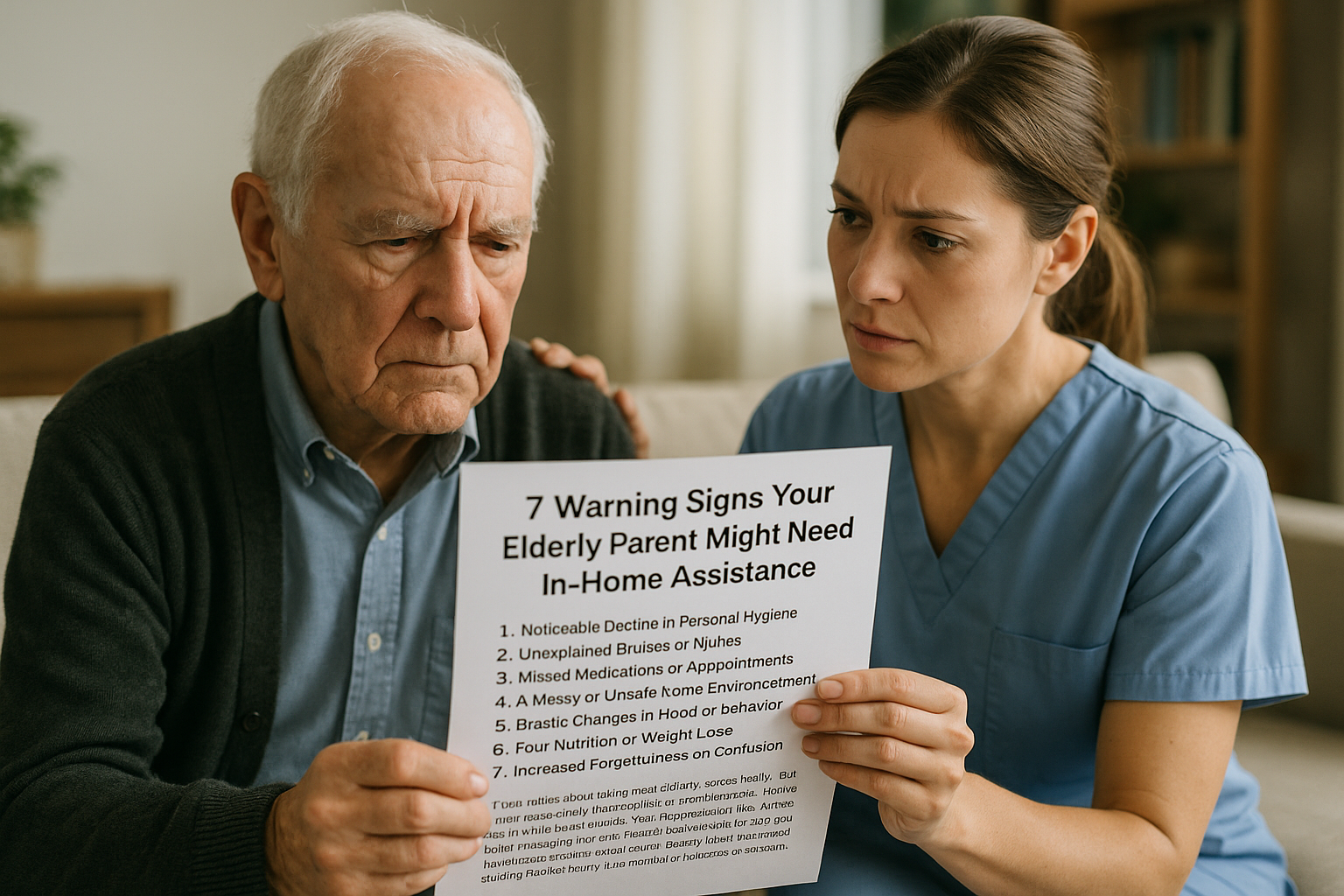As our parents age, their independence becomes both a point of pride and a growing concern. While many seniors cherish their ability to live on their own terms, there comes a time when in-home assistance can dramatically improve their safety, well-being, and overall quality of life. But how can you know when that time has come?
Recognizing the early signs that your elderly parent might need help is essential to prevent accidents, health issues, or emotional distress. Below are seven key warning signs that it may be time to consider professional in-home care.
Approaching this decision with empathy and awareness can make all the difference. It’s not just about identifying what your parent can no longer do—it’s about understanding what kind of support can help them thrive without taking away their sense of autonomy. By paying attention to subtle changes in behavior, physical abilities, or emotional state, you can take proactive steps to ensure they receive the help they need—before a crisis occurs.
1. Noticeable Decline in Personal Hygiene
If your parent is wearing the same clothes for days, skipping showers, or showing signs of poor dental or grooming habits, it could indicate difficulties with mobility, memory, or motivation. Bathing and grooming are daily tasks that can become physically taxing with age. A caregiver can help ensure these essentials are done regularly and safely.
Neglecting personal hygiene isn’t always a matter of forgetfulness—it can also stem from fear or physical discomfort. Many seniors experience joint pain, balance issues, or dizziness that make bathing or using the bathroom feel unsafe. Some may fear slipping in the shower or feel embarrassed asking for help. A trained in-home caregiver can create a safe and respectful environment, using assistive tools like shower chairs or grab bars and offering discreet assistance that preserves the individual’s dignity.
A decline in hygiene can also be linked to emotional or cognitive changes. Seniors dealing with depression or early-stage dementia may lose interest in self-care, leading to unwashed clothes, unbrushed hair, or skipped meals. These signs are important indicators that your parent may need more support than you can provide alone. A professional caregiver is trained to recognize and respond to these emotional cues, offering gentle encouragement and routine that helps the senior feel more in control and engaged.
Left unaddressed, poor hygiene can lead to health issues such as skin infections, dental problems, and urinary tract infections, especially in seniors with weakened immune systems. Ensuring regular hygiene care is not only a matter of comfort—it’s a critical part of preventive health. By bringing in a caregiver, you’re taking a step toward preserving your loved one’s health, confidence, and overall quality of life.
2. Unexplained Bruises or Injuries
Falls are one of the leading causes of injury among older adults. If you notice cuts, bruises, or limping without a clear explanation, it’s a red flag that your parent may be having trouble walking, standing, or maintaining balance. In-home caregivers can assist with mobility and help reduce the risk of dangerous falls.
Unexplained injuries may also signal that your parent is trying to manage tasks that have become too physically demanding, such as climbing stairs, carrying heavy objects, or reaching for items on high shelves. Rather than asking for help, many seniors push through out of pride or fear of losing independence—putting themselves at greater risk. A caregiver can provide the right level of support, from simple supervision to hands-on assistance, ensuring that daily activities are completed safely while preserving your parent’s confidence and autonomy.
3. Missed Medications or Appointments
Forgetfulness about taking medication or going to the doctor can have serious consequences. If your parent is skipping doses or appointments, it’s a sign they may need help managing their healthcare. A caregiver can ensure medications are taken on schedule and can accompany them to medical visits, ensuring better overall health management.
In some cases, missed medications or appointments may be due to confusion, difficulty with transportation, or a lack of motivation. Seniors with cognitive impairments, such as those experiencing early stages of dementia, may forget to refill prescriptions or neglect to follow through with important medical checkups. A professional caregiver can assist by setting up medication reminders, organizing pillboxes, and offering transportation to appointments, ensuring that your parent’s healthcare needs are consistently met. This support can help prevent complications, manage chronic conditions more effectively, and contribute to a healthier, more stable lifestyle.
4. A Messy or Unsafe Home Environment
If your once-tidy parent is now living in clutter or if there are dishes piling up, laundry undone, or expired food in the fridge, these are signs they may be struggling with home upkeep. This can also pose a safety hazard. An in-home assistant can keep the home clean, organized, and safe.
5. Drastic Changes in Mood or Behavior
Have you noticed your parent becoming unusually irritable, withdrawn, or sad? Emotional and mental changes can stem from health issues, medication side effects, or loneliness. A caregiver doesn’t just provide physical assistance—they offer companionship and emotional support to help reduce isolation.
6. Poor Nutrition or Weight Loss
Check the pantry and fridge. Is there healthy, fresh food—or mostly packaged and expired items? Seniors who find it hard to cook may resort to unhealthy snacks or skip meals entirely. A caregiver can prepare nutritious meals and ensure your parent stays hydrated and well-nourished.
7. Increased Forgetfulness or Confusion
Are they forgetting to turn off the stove? Getting lost in familiar places? Asking the same questions repeatedly? These could be early signs of cognitive decline. In-home help can provide not just safety but mental stimulation and routine, which are crucial for seniors showing signs of dementia or Alzheimer’s.
Making the Right Decision, at the Right Time
It’s never easy to admit that someone you love needs help—but ignoring the signs could lead to bigger problems down the road. Whether your parent needs just a few hours of help a week or full-time assistance, in-home caregivers provide a flexible solution that supports their independence while ensuring they stay healthy and safe.
Starting the conversation early and involving your parent in the decision can make the transition smoother. Many seniors come to appreciate the extra help and companionship that professional caregivers offer.
If you’re seeing several of these signs, it may be time to explore in-home care options. It’s not about taking away freedom—it’s about enhancing quality of life.

Carlos Maia is the dedicated writer behind the invaluable content at Digital Nearby, a blog that provides essential tips for caregivers of the elderly. With a remarkable talent for weaving words into compelling narratives, Carlos brings a unique perspective and genuine passion to every piece he creates. His extensive experience spans various fields, from healthcare to personal development, allowing him to masterfully blend knowledge and empathy in his writing. Carlos not only excels at crafting informative and engaging articles but also understands the nuanced needs and interests of his audience. His dedication ensures that each piece of content is not only relevant but also deeply impactful, offering caregivers practical advice and heartfelt support. Whether through insightful guides, touching stories, or persuasive content, Carlos has the gift of leaving a lasting impression on his readers, making their caregiving journey a little easier and a lot more fulfilling.

